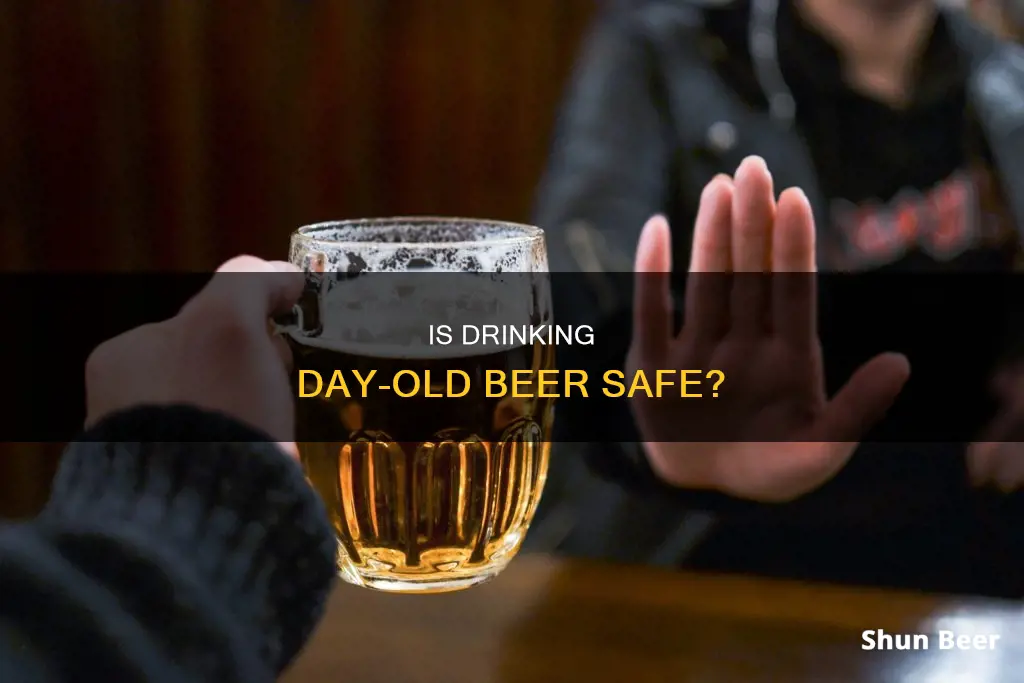
Beer is a beloved beverage for many, but what happens if you leave a bottle or can open for a day? The answer depends on several factors, including the type of beer, its alcohol content, and how it's stored. Beer has a shelf life of around two days before it loses flavour significantly. Even when refrigerated, beer left open for a day will not taste as good as a freshly opened one, but it should still be drinkable. However, it's important to note that improper storage can hasten spoilage, and beer left in the sun or exposed to light and warm temperatures can turn flat within a day.
What You'll Learn

Beer should be drunk within a day or two of opening
Beer is a popular alcoholic beverage, but many people don't know how long it lasts or whether it can expire. The answer to this question depends on the type of beer and how it is stored. Unopened beers with low alcohol content can last at least half a year if stored properly. On the other hand, vintage beers like ales, lambics, or stouts have high alcohol content and are made to last a few years. In fact, producers of these beers often recommend storing them for at least a year or two before opening to allow the beer to age and develop its distinct taste.
Once a beer is opened, it is generally recommended that it be consumed within a day or two. After this time, the beer will still be safe to drink, but its taste and quality will be noticeably different. The beer will become flat as it loses carbonation, and it may also taste stale. Therefore, it is best to drink opened beer as soon as possible to fully enjoy its intended flavour and freshness.
To maximise the shelf life of opened beer, it is important to store it properly. Beer should be kept in a cool, dark place, such as a pantry or refrigerator, and away from direct sunlight. Exposure to light can cause the beer to become "skunky," which refers to a skunk-like taste and odour that is often described as "skunked beer." Dark bottles, especially those that are dark brown, offer better protection from light than green bottles. Additionally, ensuring that the beer is tightly covered or sealed can help slow the loss of carbonation and minimise oxidation, which can alter the taste.
While opened beer can technically be consumed beyond the "expiration" date listed on the package, it is important to examine its appearance, smell, and taste before doing so. If there are any major changes in colour or odour, or if the beer tastes unpleasant (not just flat or skunky), it is best to discard it.
Beer and Fever: Is There a Link?
You may want to see also

Opened beer will go flat but is fine to drink
Opened beer will start to lose carbonation and change in taste due to oxidation. To slow this process, the beer should be resealed tightly and stored in a cool place, such as a pantry or refrigerator. Screw-top glass bottles can be stored upside down in the refrigerator, as this will create enough pressure to prevent the beer from going flat.
If you're storing an opened beer for a short period, putting it in the fridge is ideal. For longer storage, an airtight container or a bottle with a stopper that can withstand pressure is recommended. Transferring the beer to a smaller container will also help to minimise the loss of carbonation.
To further preserve the beer, some sources suggest using an inert gas like Private Preserve to replace the air in the bottle. Another method is to breathe into a ziplock bag with the beer inside, as carbon dioxide in exhaled breath will prevent oxidation.
Shingles and Beer: A Safe Mix?
You may want to see also

Beer doesn't like light—it can become 'skunky'
Beer doesn't like light—it can become "skunky".
Beer is sensitive to light, especially UV light, which can cause it to develop an unpleasant skunky odour and flavour. This is because light can react with hops in beer, producing a chemical compound that is also found in a skunk's defensive spray!
The process is similar to how sunlight causes chlorophyll in plants to degrade, turning them brown. In beer, this results in a loss of flavour and colour. Even artificial light from incandescent or fluorescent bulbs can have this effect, although to a lesser extent. So, it's best to store your beer in a dark place, such as a basement or pantry.
Clear and green bottles are particularly bad for beer, as they allow more light to pass through and react with the hops. That's why many brewers use dark amber bottles, which block out most of the harmful UV light. Cans are also a good option, as they are completely opaque, providing a barrier that protects the beer from light.
Interestingly, the way beer is brewed can also affect its sensitivity to light. For example, the popular American "adjunct pilsners" are made with corn or rice, which lightens the body and mouthfeel of the beer. However, this also makes them more susceptible to light damage. So, if you're looking to buy beer that will last longer, consider a darker variety or one packaged in cans or dark bottles.
Beer and Creatine: Safe to Mix?
You may want to see also

Beer should be stored in a cool place, like a pantry
Beer is best stored in a cool, dark place—the pantry is ideal. Exposure to sunlight creates a chemical reaction in the beer, breaking down its flavour components until it smells and tastes like skunk spray. This is why beer that has been exposed to sunlight for too long is said to have been "skunked" or "lightstruck".
Brown bottles are best for protecting beer from sunlight, as they block out light under 500nm. Green bottles can only block light below 400nm (ultraviolet light), while clear bottles offer no protection at all. This is why craft brewers tend to use brown bottles.
It's also important to keep beer away from fluorescent light, which can accelerate its best-before date. A basement, under-bed storage, or a closet are all good choices for elongating your beer's life.
The ideal temperature for storing beer is between 45 and 55 degrees Fahrenheit. This will ensure the beer remains its best quality for up to eight months. If you don't have a way of measuring the temperature, you can keep your unopened beer in the fridge, where it will remain its best quality for up to eight months. You can also store unopened cans or bottles at room temperature, where they will stay the best quality for up to six months.
If you have an open beer, it's best to drink it as soon as possible. Opened beer will begin to lose carbonation and oxidise. However, if you want to preserve it, use an airtight cap or stopper to reduce oxidation and prevent carbonation loss.
Ginger Beer and Breastfeeding: Is It Safe to Drink?
You may want to see also

Beer can be spoilt—if it looks, smells, or tastes bad, throw it out
Beer is a popular alcoholic beverage, but it can spoil and go bad. Beer can last half a year if it is unopened and stored properly. However, once a beer is opened, it should be consumed within a day or two. After that, the beer will be flat, and its taste will be far from expected. Beer is also sensitive to light, and exposure to light can cause it to become "skunky". Therefore, it is recommended to store beer in a dark place away from direct sunlight.
Additionally, it is important to keep beer in a cool place, such as a pantry. If you want to store opened beer for a short period, it is best to put it in the fridge. Beer can be spoilt, and if it looks, smells, or tastes bad, it is best to throw it out. Spotting spoiled beer is easy. If there is a major change in colour, odour, or taste, it is best to discard it.
There are ways to prolong the life of opened beer. To prevent oxidation and loss of carbonation, it is important to reseal the bottle tightly and store it in the fridge. Using airtight caps or stoppers can help maintain the carbonation and slow down the deterioration process. Some people also suggest transferring the beer to a smaller bottle or container to reduce the air gap and slow down the loss of carbonation.
In summary, beer can be safely consumed after it has been opened for a day or two, but it is essential to store it properly and check for any signs of spoilage before drinking. If the beer looks, smells, or tastes bad, it is best to discard it.
Jaundice Recovery: Is Beer a Friend or Foe?
You may want to see also
Frequently asked questions
Yes, it is safe to drink an open beer that has been left out overnight. However, the beer will be flat and its taste and flavour will be significantly reduced.
Beer can be left open for up to two days before it's unsafe to drink. However, it's important to note that this is dependent on the storage conditions. Beer left in direct sunlight or warm temperatures will spoil faster.
To extend the shelf life of an open beer, it is recommended to store it in an airtight container in the refrigerator. This will help to slow down the oxidation process and prevent contamination from bacteria and other microbes.







